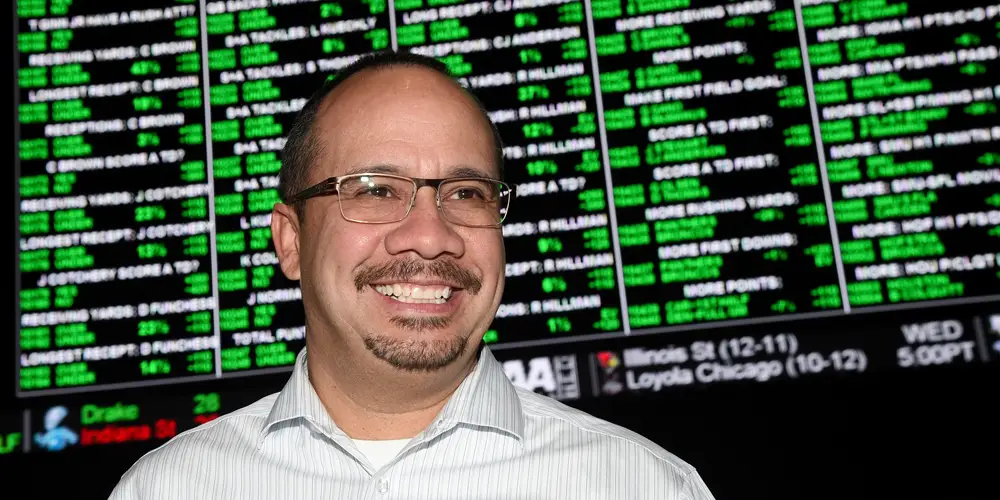
Ask a Bookmaker with Jay Kornegay: Responsible Gambling is Part of the Job
September 28, 2022
By Mike Seely Sept. 27, 2022 | US Bets
CLICK HERE TO VIEW FULL ARTICLE
Welcome to US Bets’ recurring “Ask a Bookmaker” column, which answers many of the common (and uncommon!) questions gamblers and enthusiasts have about how sportsbooks operate in the modern age of sports betting.
The executive vice president of race and sportsbook operations at the Westgate SuperBook, Jay Kornegay has been in the sports betting industry for more than 30 years. After getting his start in Lake Tahoe, Kornegay took his talents to Las Vegas, where he opened the Imperial Palace sportsbook in 1989 before taking the reins of the 30,000-square-foot SuperBook in 2004. A Colorado State University alum whose putting stroke tends to betray him on the back nine, Kornegay has helped navigate the SuperBook’s expansion into multiple states since PASPA was overturned in 2018.
Have a question you’d like to ask Kornegay? Send it to mseely@bettercollective.com. The Q&A below has been edited for clarity and brevity.
As Responsible Gaming Education Month winds down, I wanted to ask you how sportsbooks have adjusted their approach to problem gamblers over the course of your 30-plus-year career. Has it gotten a lot more sophisticated over the years?
The gaming world recognized that they needed to do more to promote responsible gaming about 20 years ago. So the campaign of “When the Fun Stops” started. Ever since then, it’s been part of our training program each and every year. We have semi-annual training on many different things, including responsible gambling.
At first, it wasn’t part of our world, but I think operators knew it was something they needed to do.
What are some of the guardrails the SuperBook has in place to deal with truly reckless or addictive gambling?
We provide information on responsible gaming throughout our offerings. It includes the state and/or the national hotline for problem gambling. This information is readily available throughout our marketing, throughout our terms and conditions, throughout our operation. It’s very standard for us to have this information available for all to see.
What sort of training does the SuperBook put its employees through in order to prepare them to spot or interact with problem gamblers?
We train our tellers, our line supervisors and, most importantly, our customer service representatives.
What do you talk to them about?
Looking for concerning quotes from customers. People saying, “I really need to win this wager to pay my rent tomorrow.” Noticing that people are losing time from work or school or family, listening for borrowing money from others, maybe lying about the time they’re spending on gambling. Maybe the guy’s been in here all week long and he’s telling others that this is the first time he’s been here all week.
What would the staff do if they identified a potential problem gambler?
They would have to alert a supervisor, then the supervisor would most likely contact the customer.
How has the spread of mobile betting impacted how you identify or deal with problem gamblers?
There are a number of safeguards on the app itself. Players can create their own limits, which would include daily, weekly, monthly deposit and wager limits. Certain jurisdictions require cool-off periods that the player can set to prevent them from wagering for a certain amount of time. If you set that cool-off period for three days, that means that you cannot make a wager for three days. There are also app time limits.
New Jersey, specifically, you have a lifetime acknowledgment of your deposits. Once you go over $2,500 in deposits in New Jersey, you have to acknowledge that before you can continue using that app. You won’t be able to make any wagers until you acknowledge that you have deposited $2,500.
Do you flag any reckless wagering patterns internally?
It would be very difficult to monitor that. It’s all relative. A guy who’s betting $5 five times a day, is that reckless? I don’t know. Anybody that has a gambling addiction, we want to recognize that and we want to help that person. We’re not looking to attract that type of business. We want people to be responsible, we want them to enjoy it and stay within their means.
Sportsbook employees obviously have a lot more exposure to sports betting than the average recreational bettor. As far as your own employees’ gambling, do you have guidelines in place to ensure they wager responsibly?
When they go through the training program, it’s not only for the customer, it’s for themselves as well, to watch over their team members and co-workers and recognize possible warning signs. They’re not easy to detect sometimes. When they’re lying or gambling more than their means, going to the pawn shop, those are all recognizable warning signs that they’re trained to look for — not just from customers, but from their co-workers as well.
What are some of the steps a sportsbook can take to either stop a problem gambler from wagering or curtail that person’s behavior?
We’ll offer them help and assistance. We don’t want to embarrass them. It’s a very private matter, whether it’s a co-worker or a customer. If we feel like it’s a definite problem, we’re going to seek help for this person. It is difficult at times. Some people just like to talk. You never know if they’re actually playing above their means or just talking their game up, as they say — just trying to grab attention.
It’s a very fine line, but we have contacted customers before and asked them if they needed assistance. Self-exclusion is available and we’re all for that. It helps when they can recognize it themselves, but we’re here to assist. Recognizing the warning signs is part of our job.





